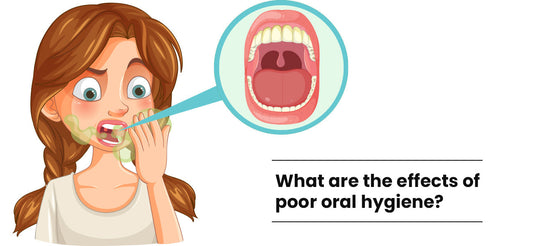Fasting and low-carb diets are popular for weight loss and overall health, but they often come with an unpleasant side effect - bad breath. Whether you are skipping meals for fasting or cutting carbs to burn fat, you might notice that your breath isn’t as fresh as you would like.
The good news?
Bad breath during fasting or a bad breath from a low-carb diet isn’t a permanent problem. With the right oral care habits and dietary adjustments, you can enjoy the benefits of your diet without worrying about smelly breath.
In this guide, we will discuss the bad breath causes, how fasting and low-carb diets contribute to it, and practical strategies on how to avoid bad breath while maintaining good oral health.
Why Does Fasting or a Low-Carb Diet Cause Bad Breath?
Before we discuss how to avoid smelly breath, let us first understand why it happens.
1. Ketosis and Bad Breath from Low-Carb Diet
One of the most common bad breath causes for people on a low-carb diet is ketosis(1). When you drastically reduce your carb intake, your body switches to burning fat for energy. This process produces ketones, which are expelled through breath and urine.
• The most noticeable ketone is acetone, which gives off a strong, fruity, or even metallic smell.
• This odour doesn’t come from your mouth but from deep within your metabolism, making it harder to mask with regular mouthwash or mints.
2. Dry Mouth from Fasting
Saliva is essential for washing away bacteria and food particles that contribute to bad breath. But when you fast, your body produces less saliva, leading to dry mouth(2).
• A dry mouth allows bacteria to thrive, creating bad breath during fasting.
• This is especially noticeable in the morning when saliva production is naturally lower.
3. Bacteria and Poor Oral Hygiene
Even if you are eating less, bacteria are still active in your mouth. Without regular cleaning, food particles, plaque, and bacteria can accumulate, leading to bad breath.
• Skipping oral care routines during fasting can cause bad breath to worsen.
• Unclean tongues and unflossed teeth harbor odour-causing bacteria.
4. Digestive Issues and Stomach Acid
Going long hours without food may sometimes trigger acid reflux, where stomach acids rise up into the throat. This can create an unpleasant taste and bad breath during fasting.
How to Avoid Bad Breath While Fasting or on a Low-Carb Diet
Now that you know why it happens, here are a few effective strategies for how to avoid bad breath while fasting or following a low-carb diet.
1. Stay Hydrated
Drinking enough water is one of the easiest ways to prevent bad breath during fasting. Proper hydration helps maintain saliva production to wash away bacteria, flush out ketones from the body, reduce their odour in your breath, prevent dry mouth, a major cause of bad breath.
Tip: Sip water regularly throughout the day, even if you are fasting. If fasting rules allow, drinking herbal teas or lemon-infused water can also help.
2. Practice Good Oral Hygiene
A clean mouth is essential for fresh breath, regardless of your diet. Follow these oral health steps:
• Brush Twice a Day:
Use fluoride toothpaste to remove plaque and bacteria. Brush your tongue as well, as it harbors odour-causing bacteria.
• Floss Daily:
Food particles stuck between teeth can contribute to bad breath causes. Flossing prevents buildup and gum infections.
• Use an Alcohol-Free Mouthwash:
Rinse with a mild, alcohol-free mouthwash to kill bacteria without drying out your mouth.
Tip: If you can’t brush after meals, rinse your mouth with water or chew sugar-free gum to keep bacteria in check.
3. Clean Your Tongue Daily
Your tongue can trap bacteria and food debris, leading to persistent bad breath. Use a tongue scraper or the back of your toothbrush to clean your tongue every morning. Pay extra attention to the back of the tongue, where bacteria tend to accumulate.
Tip: If your tongue has a white coating, it is a sign that bacteria buildup may be contributing to bad breath from a low-carb diet. Regular tongue cleaning can significantly reduce odour.
4. Try Oral Health Tablets and Supplements
Certain supplements can improve oral health and freshen breath naturally.
• Probiotic Supplements:
Support gut health and reduce digestive-related bad breath.
• Zinc Tablets:
Zinc neutralizes sulfur compounds that cause bad breath(3).
• Oral Health Tablets:
Natural breath fresheners that help reduce odour from ketones.
Tip: If you frequently experience bad breath causes related to digestion, consider adding a gut-health probiotic to your daily routine.
5. Chew Sugar-Free Gum or Fennel Seeds
• Sugar-free gum stimulates saliva production, helping to wash away bacteria.
• Fennel seeds act as a natural breath freshener and antibacterial agent.
Tip: Avoid gum with artificial sweeteners like aspartame, as they can sometimes worsen bad breath. Instead, choose xylitol-based gum, which helps fight bacteria(4).
6. Adjust Your Diet for Better Breath
Certain foods can help reduce bad breath from a low-carb diet and neutralize odours. Here are a few examples:
• Leafy greens (spinach, parsley) –
Rich in chlorophyll, which naturally freshens breath.
• Cucumber and celery –
High water content helps cleanse the mouth.
• Lemon –
Helps stimulate saliva and digestion.
Tip: If your breath worsens after switching to a low-carb diet, try increasing your fiber intake to help balance digestion.
7. Don’t Skip Your Morning Oral Routine
Morning breath is common, but it gets worse during fasting because of decreased saliva production. Brush your teeth and scrape your tongue first thing in the morning to remove overnight bacteria.
Tip: Drink a glass of water before speaking to hydrate your mouth and eliminate stale morning breath.
Conclusion
You don’t have to choose between following your diet and having fresh breath. Whether you're dealing with bad breath during fasting or bad breath from a low-carb diet, the key is hydration, oral hygiene, and mindful food choices.
By following these simple steps, staying hydrated, practicing good oral health, using natural breath fresheners, and considering oral health tablets, you can confidently maintain fresh breath while enjoying the benefits of your diet.
No more awkward conversations or covering your mouth, just fresh, healthy breath, no matter your eating habits!
References
- Musa-Veloso, K., Likhodii, S. S., & Cunnane, S. C. (2002). Breath acetone is a reliable indicator of ketosis in adults consuming ketogenic meals,,. American Journal of Clinical Nutrition, 76(1), 65–70. https://doi.org/10.1093/ajcn/76.1.65
- Taher, H. A., Salah, A., Rammal, C., & Varma, S. R. (2024). Role of ketogenic diet and its effect on the periodontium. A scoping review. Frontiers in Oral Health, 5. https://doi.org/10.3389/froh.2024.1364578
- Uwitonze, A. M., Ojeh, N., Murererehe, J., Atfi, A., & Razzaque, M. S. (2020). Zinc adequacy is essential for the maintenance of optimal oral health. Nutrients, 12(4), 949. https://doi.org/10.3390/nu12040949
- Janakiram, C., Kumar, C. V. D., & Joseph, J. (2017). Xylitol in preventing dental caries: A systematic review and meta-analyses. Journal of Natural Science Biology and Medicine, 8(1), 16. https://doi.org/10.4103/0976-9668.198344






